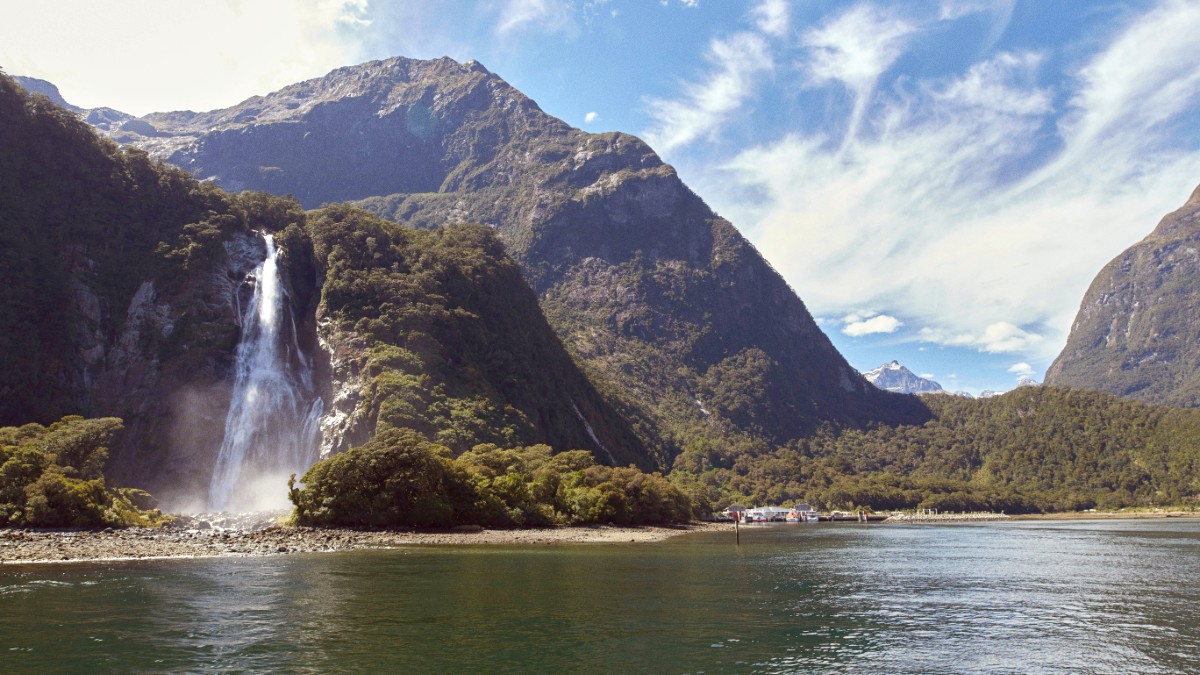
Fiordland And Southland, New Zealand
Milford Sound beckons visitors to a world where mountains meet the sea in an embrace of epic proportions. It is a destination that captivates the senses, with sights, sounds, and an atmosphere unlike anywhere else. The air carries the scent of damp earth and verdant foliage. Water drips and roars, a constant symphony from the numerous waterfalls. Even on overcast days, which are common, the moody atmosphere makes the drama more profound, cloaking the peaks in mist and lending a mysterious aura to the fiord. This environment invites you to pause, breathe deeply, and fully absorb the immense beauty around you.
A visit to Milford Sound is more than a simple sightseeing trip; it is an immersion. Whether you cruise its length, paddle its calm waters by kayak, or walk along its rainforest trails, the experience leaves a lasting impression. You feel small yet connected to something immense, a timeless landscape that has remained largely untouched by human development.
This guide details comprehensive information, helping you plan a visit to this extraordinary corner of the world. It covers how to travel here, what to anticipate, and how to maximize your time in a place that truly defines natural wonder.
Milford Sound, or Piopiotahi as it is known in Māori, is a true geographical marvel. It lies in the southwest of New Zealand's South Island, a remote and rugged region part of Fiordland National Park. This park, in turn, belongs to the Te Wāhipounamu UNESCO World Heritage site, a vast area recognized for its geological and biological significance.
The fiord stretches approximately 15 kilometers inland from the Tasman Sea. Its narrow, deep waters are flanked by towering rock faces. These cliffs reach hundreds of meters vertically from the water's edge, creating a sense of being enclosed by nature's immense architecture. Mitre Peak, an iconic mountain, rises an impressive 1,692 meters directly from the fiord. Numerous waterfalls characterize the landscape, many permanent, fed by high rainfall and alpine meltwaters.
A U-shaped valley carved by ancient glaciers, now flooded by the sea.
A distinctive mountain rising 1,692 meters directly from the fiord's waters.
Home to permanent falls like Bowen Falls (162m) and Stirling Falls (151m), plus countless temporary cascades.
A freshwater layer on top of saltwater creates a 'dark zone' below, fostering unique marine life.
The single access road, a scenic journey through dramatic alpine landscapes.
The fiord's waters themselves show an interesting geographical phenomenon. A layer of dark, tannin-stained freshwater from surrounding rainforest runoff floats on top of the saltwater. This freshwater layer, typically several meters deep, filters light. It creates a "dark zone" below, allowing deep-water marine life, like black corals, to grow at much shallower depths than they typically would. This unique hydrological feature makes Milford Sound a fascinating location for diving and marine research.
Access to Milford Sound comes only by a single road, State Highway 94, also known as the Milford Road. This road becomes an experience in itself, winding through dramatic alpine scenery, deep valleys, and passing through the Homer Tunnel. The journey along Milford Road sets the mood for the grandeur awaiting at the fiord, with spectacular viewpoints and short walks along the way.
Despite its remote nature, Milford Sound is the most accessible of Fiordland's fiords, making it a popular destination for visitors seeking a powerful wilderness experience. Its isolation works to preserve its pristine environment, presenting a glimpse into a world largely untouched by extensive human development.
Milford Sound is a rich history, reaching back millennia to its deep connection with the Māori people, who knew it as Piopiotahi. This name refers to a now-extinct native bird, the piopio. According to Māori legend, the demigod Maui died here while trying to win immortality for humankind. The lamenting tears of a bird, the piopio, are said to have formed the fiord.
Another legend tells of Tu-te-raki-whanoa, a god-like figure who carved out the fiords of Fiordland with his adze, shaping the dramatic landscape. He shaped Piopiotahi with such care and beauty that he placed a sandfly guardian at its entrance to ensure people would not linger too long and become complacent in its beauty. This Māori history speaks to a deep spiritual and cultural connection to the land, viewing it as a living entity imbued with ancestral stories and power.
For Māori, Fiordland served as a place for seasonal hunting and gathering, traversing challenging routes to collect pounamu (greenstone).
Captain John Grono sailed into the fiord in 1812, naming it Milford Haven. Early activities centered on sealing and whaling.
Donald Sutherland became the first permanent European resident in 1877, establishing a guesthouse.
A major milestone arrived with the construction of the Homer Tunnel. Work began in 1935, facing immense engineering challenges. Workers held on harsh conditions, and progress was slow. The tunnel was completed in 1953, opening road access to Milford Sound for the first time.
Milford Sound, often described as the "Eighth Wonder of the World," offers a powerful and unforgettable natural experience. This snapshot provides a concise overview of what makes it such a sought-after destination and what visitors may find.
Towering peaks, sheer rock faces, and permanent or temporary waterfalls define the landscape. The immense scale of nature's artistry is truly grand.
Numerous operators offer boat tours that navigate the fiord, passing iconic landmarks and spotting wildlife like seals, dolphins, and penguins.
Located within Fiordland National Park, infrastructure is limited. Te Anau acts as the main gateway town for most services.
The journey along State Highway 94 is a celebrated scenic drive. It passes through stunning valleys and the Homer Tunnel. Drive carefully, especially in winter.
Located 120 km away, Te Anau serves as the main hub. It offers a wider range of services, including hotels, restaurants, and a supermarket. Most visitors stay here.
Milford Sound experiences high rainfall year-round. Rain elevates the fiord's beauty by activating hundreds of temporary waterfalls. Waterproof clothing is a must-have.